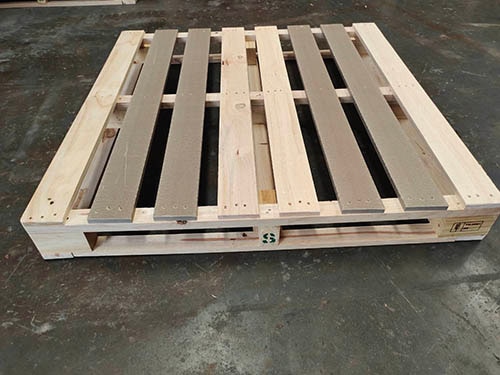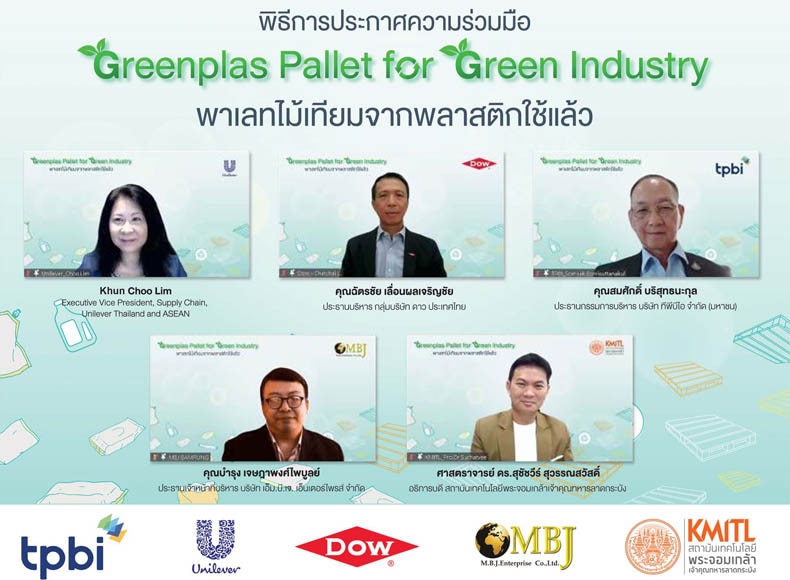Bangkok – October 28, 2021 - Five leading organizations, including Dow Thailand Group (Dow), Unilever Thailand Group, TPBI Public Company Limited, M.B.J. Enterprise Company Limited, and King Mongkut's Institute of Technology Ladkrabang, jointly announced the successful development of pallets for use in warehouses and industrial transport made from artificial wood mixed with recycled plastic packagings such as liquid soap bags, softener refill bags, and shampoo sachets. Dow has started using the Greenplas Pallets in its warehouse, which can divert more than 104 tons of plastic waste per year from the landfill in the initial phase.
 "Greenplas Pallets" are made from artificial wood, with a mixture of wood powder and used plastic replacing 10-45% of natural wood with hard-to-recycle plastics. The recycled plastics include packaging bags made from multiple layers of plastic (M.L.P.), such as fabric softener bags, detergent bags, and shampoo-conditioner packets, as well as colored or opaque shampoo bottles and dishwashing liquid bottles. There are plans to expand testing to other plastics in the next phase. The project encourages public engagement by urging them to sort plastic waste in households as raw material for pallets production, another way to create participation in advancing the circular economy.
"Greenplas Pallets" are made from artificial wood, with a mixture of wood powder and used plastic replacing 10-45% of natural wood with hard-to-recycle plastics. The recycled plastics include packaging bags made from multiple layers of plastic (M.L.P.), such as fabric softener bags, detergent bags, and shampoo-conditioner packets, as well as colored or opaque shampoo bottles and dishwashing liquid bottles. There are plans to expand testing to other plastics in the next phase. The project encourages public engagement by urging them to sort plastic waste in households as raw material for pallets production, another way to create participation in advancing the circular economy.Due to their use for storage and transportation of goods in almost every industry, artificial wood pallets are one of the few products today that can recycle substantial amounts of plastic waste. Moreover, the artificial wood produced by the project can be used for other applications in the future, such as in furniture, fences, and playgrounds. Dow plans to use 147,000 sheets of the artificial woods to make 59,000 pieces of "Greenplas Pallets" in the first year, reducing carbon dioxide emissions by about 108 tons per year—equivalent to planting 333 trees annually.
The artificial wood panels used in producing "Greenplas Pallets" are strong, flexible, and can be drilled or nailed for effective adhesion. They can support the same weight as pallets made of natural wood, delivering on global environmental policies, such as the U.N.'s S.D.G.s. They also help fulfill national policies, such as the Thailand government economic policy B.C.G. (Bio-Circular-Green), while promoting the corporate sustainability goals of participating companies and stakeholders.

"Dow Thailand Group is committed to putting our expertise and experience to use in innovating and implementing various circular economy projects. In line with Dow's sustainability goals, we are creating a market for used plastics, adding value to them to be collected for reuse. By 2030, we aim to enable 1 million tons of plastic waste to be recycled or reused through our company's operations and collaborations with various sectors," said Chatchai Luanpolcharoenchai, Dow Thailand President.
"Unilever is delighted to be a part of this innovative achievement that will replace the low value multi-layer plastic flexibles, which are the most challenging plastic type to recycle and often spill into the environment. Now, with this special effort, they become renewable raw materials that can be put to effective use. This is aligned with Unilever's plastics commitment to collect and process more plastic packaging than we sell by 2025. Via this cooperation, we can bring post-consumer plastic waste into the circular economy through innovative technology," said Choo Lim, Executive Vice President, Supply Chain, Unilever Thailand and ASEAN.
In addition to early deployment in Dow factories and warehouses, the project partners of the five organizations are committed to jointly expanding their use to other organizations, increasing the demand for "Greenplas Pallets" as well as campaigning for consumers to participate in the separation of used packaging bags. This will allow post-consumer plastics to be utilized on a larger scale and have a greater positive impact on the environment of Thailand.
"We are extremely proud to be a part of the 'Greenplas Pallet for Green Industry' project, which is a research and development collaboration between DOW, Unilever Thailand, M.B.J. Enterprise Company Limited, King Mongkut's Institute of Technology Ladkrabang, and TPBI Public Company Limited. The project aims to develop plastic pallets using upcycled plastic waste, especially consumer product packaging, which is difficult to recycle. The comprehensive plastic waste management initiative encompasses multiple processes, from acquiring used plastic materials to manufacturing plastic pallets using recycled plastic waste. The pallets have been evaluated and proved to be sturdy, durable, and as functionally efficient as conventional wood pallets, marking a success for the joint circular economy efforts—which can serve as a pilot project for circular economy applications," said Somsak Borrisuttanakul, Chairman of Executive Committee of TPBI Public Company Limited.
"The partnership is a significant step toward creating a new economy where waste products can be upcycled and turned into beneficial innovations. The 'Greenplas Pallet for Green Industry' project uses multi-layer plastic waste, a raw material requiring a cumbersome recycling process, to produce high-quality and strong pallets with multiple applications across a wide range of industries. The company believes that the Greenplas pallets will not only help solve environmental problems more sustainably but will also contribute to the development of other value-added products," said Bamrung Jadsadaphongphaibool, Chief Executive Officer of M.B.J Enterprise Co., Ltd.
"King Mongkut's Institute of Technology Ladkrabang (KMITL) has played a key role in the 'Greenplas Pallet for Green Industry' project, successfully developing and producing plastic pallets suitable for commercial use. The collaboration aligns with our institute's commitment to creating world-class innovations with a vision to become 'The World Master of Innovation.' Our five aspects supporting sustainability include the following: 1. Disruptive Curriculums: 'Designing and providing curriculums that are up-to-date and adaptive to changes to meet the Thailand 4.0 objective; 2. Disruptive Research and Innovation: 'Encouraging advanced research and innovation' to elevate Thailand's promotion of commercial innovation; 3. Creative Ecosystem. 'Creating an ecosystem for creativity' to inspire the creation of fresh physical and digital innovation products; 4. Talent Empowerment. 'Enhancing students' and staff members' competency' by developing a system that will help deliver on their full potential; 5. Sustainable Development: 'Continuously strive for sustainability' by establishing an ecosystem of sustainable development to prepare for global changes," said Prof. Dr. Suchatvee Suwansawat, President of King Mongkut's Institute of Technology Ladkrabang.
In the project's initial phase, the "Greenplas Pallets" will be used at Dow's factories and warehouses. In the future, their use will be expanded to other markets across various business sectors. All five organizations collaborating in this partnership are committed to developing and improving the product and promoting public engagement in separating used packaging to be used as raw material. Through the project, recycled plastic products will be recycled more extensively, thus reducing the negative impact on the country's environment.
About Dow
Dow (NYSE: DOW) combines global breadth, asset integration and scale, focused innovation and leading business positions to achieve profitable growth. The Company's ambition is to become the most innovative, customer centric, inclusive and sustainable materials science company, with a purpose to deliver a sustainable future for the world through our materials science expertise and collaboration with our partners. Dow's portfolio of plastics, industrial intermediates, coatings and silicones businesses delivers a broad range of differentiated science-based products and solutions for its customers in high-growth market segments, such as packaging, infrastructure, mobility, and consumer care. Dow operates 106 manufacturing sites in 31 countries and employs approximately 35,700 people. Dow delivered sales of approximately $39 billion in 2020. References to Dow or the Company mean Dow Inc. and its subsidiaries. For more information, please visit www.dow.com or follow @DowNewsroom on Twitter.
For further information, please contact:
Apiradee Poopirom
Dow Thailand Group
Tel. 02-3657296 / 081-8026933
Email: papiradee@dow.com
Suttipong Krotintakom
Dow Thailand Group
Tel. 038-673315 / 081-7919626
Email: skrotintakom@dow.com
Lalida, Tisadondilok
Dow Thailand Group
Tel. 02-365-7228 / 089-6687079
Email: lalida@dow.com
